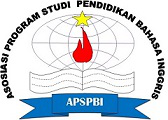GAMIFICATION-BASED APPS IN TEACHING AND LEARNING ENGLISH: A SYSTEMATIC LITERATURE REVIEW
Abstract
Keywords
Full Text:
PDFReferences
Al-Rayes, S., Al Yaqoub, F. A., Alfayez, A., Alsalman, D., Alanezi, F., Alyousef, S., AlNujaidi, H., Al-Saif, A. K., Attar, R., Aljabri, D., Al-Mubarak, S., Al-Juwair, M. M., Alrawiai, S., Saraireh, L., Saadah, A., Al-umran, A., & Alanzi, T. M. (2022). Gaming elements, applications, and challenges of gamification in healthcare. Informatics in Medicine Unlocked, 31, 100974. https://doi.org/https://doi.org/10.1016/j.imu.2022.100974
Alzahrani, F. K., & Alhalafawy, W. (2022). Platforms At Higher Education: A Systematic Review of Research Studies Benefits and Challenges of Using Gamification Across Distance Learning Platforms At Higher Education: A Systematic Review Of Research Studies Published During The COVID-19 Pandemic. November.
Amalia, I. (2022). The Effect of Kahoot Application In Improving Students’ Writing Skill (Quasi Experimental Design At SMAN 1 LURAGUNG). Indonesian Journal of Learning and Instruction, 5(1), 23–30. https://doi.org/10.25134/ijli.v5i1.5873.Received
Aprilani, D. N. (2021). Students’ Perception in Learning English Vocabulary Through Quizlet. Journal of English Teaching (JET), 7(3), 343–353.
Artati, N. L. R. (2021). The Effect of Kahoot As an Ice Breaker on EFL Students’ Motivation. The Art of Teaching English as a Foreign Language, 2(2), 89–97. https://doi.org/10.36663/tatefl.v2i2.121
Asmara, C. H., Muhammad, R. N., & Aini, J. N. (2022). The use of quizizz application for measuring EFL students’ engagement at SD Muhammadiyah Manyar. PROJECT (Professional Journal of English Education), 5(4), 750–756.
Aulia, H. R., Wahjuningsih, E., & Andayani, R. (2020). The Effect of Duolingo Application on Students’ English Vocabulary Mastery Husnur. English Language Teaching and Research Journal, 4(2), 29–37.
Borras-Gene, O., Martiñez-nunez, M., & Fidalgo-Blanco, Á. (2016). New Challenges for motivation and learning in engineering education using gamification in MOOC. International Journal of Engineering Education, 32(1), 501–512.
Budiani, N. L. I., Artini, L. P., & Pratiwi, N. P. A. (2020). The Effect of Duolingo on The Writing Competency Of The Tenth Grade Students Of SMK N 1 Sukasada In Academic Year 2017 / 2018. 8(1), 21–30.
Burrell, N. A., & Gross, C. (2017). The SAGE Encyclopedia of Communication Research Methods. SAGE Publications, Inc. https://doi.org/10.4135/9781483381411 NV - 4
Chans, G. M., & Portuguez Castro, M. (2021). Gamification as a strategy to increase motivation and engagement in higher education chemistry students. Computers, 10(10), 1–24. https://doi.org/10.3390/computers10100132
Dellos, R. (2015). Kahoot! A Digital Game Resource for Learning. International Journal of Instructional Technology and Distance Learning, 12, 49–52.
Deterding, S., Dixon, D., Khaled, R., & Nacke, L. (2011). From game design elements to gamefulness: Defining “gamification.” Proceedings of the 15th International Academic MindTrek Conference: Envisioning Future Media Environments, MindTrek 2011, September 9–15. https://doi.org/10.1145/2181037.2181040
Dewi, K. S., Myartawan, I. P. N. W., Swari, N. K. T. A., & Sugihartini, N. (2020). Quizizz Effect on Students’ Grammar Mastery In Higher EFL Classroom Based Mobile Assisted Language Learning (MALL). 3(1), 15–24.
Dhamayanti, F. I. (2021). EFL Students’ Perception and Motivation Toward Quizizz as E-Learning Media in English E-Classroom. 4(2), 70–77. https://doi.org/10.21776/ub.educafl.2021.004.02.03
Dichev, C., & Dicheva, D. (2017). Gamifying education: what is known, what is believed and what remains uncertain : a critical review. International Journal of Educational Technology in Higher Education. https://doi.org/10.1186/s41239-017-0042-5
Fink, A. (2019). Conducting Research Literature Reviews: From the Internet to Paper. SAGE Publications Ltd.
Fithriani, R. (2021). The Utilization of Mobile-assisted Gamification for Vocabulary Learning: Its Efficacy and Perceived Benefits. 22(3), 146–163.
Godwin-Jones, R. (2014). Games in language learning: Opportunities and challenges. Language Learning and Technology, 18, 9–19.
Hakimantieq, H., Suherdi, D., & Gunawan, W. (2022). Duolingo as A Mobile-Assisted Language Learning: A New Supplementary of Learning Basic English Reading for EFL Students. Edukatif: Jurnal Ilmu Pendidikan, 4(6), 7548–7558.
Hidayati, T., & Diana, S. (2020). Students’ Motivation to Learn English Using Mobile Applications: The Case Of Duolingo And Hello. JEELS (Journal of English Education and Linguistics Studies), 6(2), 189-213. Provides, 21(1), 1–9.
Inayati, N., & Waloyo, A. A. (2022). The influence of Quizziz-online gamification on learning engagement and outcomes in online English language teaching. Journal on English as a Foreign Language, 12(2), 249–271.
Jannah, M., & Syafryadin, S. (2022). EFL students’ perspectives on the use of Wordwall.net as vocabulary learning media. ELT Forum: Journal of English Language Teaching, 11(2), 115–124. https://doi.org/10.15294/elt.v11i2.57120
Katemba, C. V, Tobing, J. H. L., & Putri, T. A. (2022). Do KAHOOT! Games Enhance Vocabulary Learning? Revija Za Elementarno Izobraževanje Journal of Elementary Education, 15(3), 393–408.
Kerres, M., & Bedenlier, S. (n.d.). Systematic Reviews in Educational.
Kusmayanti, I. N., Hendryanti, R., Lecturer, E., Telkom, U., Lecturer, E., & Telkom, U. (2021). SQUARE TALKS ®: A Mobile App to Support EFL Learners’. 8(2), 139–151. https://doi.org/10.33394/jo-elt.v8i2.4393
Kusumayanthi, S., & Rusmiyati, M. (2021). Students’ Engagement in Learning English Vocabulary Via Games In KAHOOT! English Journal Literacy UTama, 6(1), 444–452.
Linehan, C., Ben, K., Lawson, S., & Chan, G. G. (2011). Practical, appropriate, empirically validated guidelines for designing educational games. Conference on Human Factors in Computing Systems - Proceedings, May 2014, 1979–1988. https://doi.org/10.1145/1978942.1979229
Mahbub, M. A. (2020). Journal on English as a Foreign Language Learning English mediated by Kahoot: Insights from the Indonesian EFL instructors. 10(2), 246–267.
Mahbub, Moh. A., Romsi, A., Bulqiyah, S., & Firdaus, I. A. (2020). Infusing a Gamification Mechanism Through Duolingo for English Speaking Proficiency: Perceptions of the Indonesian Efl Instructor and Students. Konstruktivisme: Jurnal Pendidikan Dan Pembelajaran, 12(1), 69–80. https://doi.org/10.35457/konstruk.v12i1.894
Mahbubah, L., & Anam, S. (2022). Students’ perceptions of the implementation of Kahoot! in English language teaching. Lingua Scientia, 29(1), 23–32.
Mahnič, N. (2014). Gamification of politics: Start a new game! Teorija in Praksa, 51(1), 143–161.
Majuri, J., Koivisto, J., & Hamari, J. (2018). Gamification of education and learning: A review of empirical literature. CEUR Workshop Proceedings, 2186(September), 11–19.
Molina-Azorin, J. F. (2016). Mixed methods research: An opportunity to improve our studies and our research skills. European Journal of Management and Business Economics, 25(2), 37–38. https://doi.org/10.1016/j.redeen.2016.05.001
Munawir, A., & Hasbi, N. P. (2021). The Effect of Using Quizizz To EFL Students’ Engagement And Learning Outcome. English Review: Journal of English Education, 10(1), 297–308.
Pahamzah, J., Syafrizal, S., Juniardi, Y., & Sukaenah, P. M. (2020). Quizizz as a students’ reading comprehension learning media: a case study at the eleventh grade of Dwi Putra Bangsa vocational school in Cimanggu. International Journal of English Language and Linguistics Research, 8(5), 27–33.
Rachman, D., Soviyah, S., Fajaruddin, S., & Pratama, R. A. (2020). Reading engagement, achievement and learning experiences through Kahoot. LingTera, 7(2), 168–174.
Richter, O. Z., Kerres, M., Bedenlier, S., Bond, M., & Buntin. (2019). Systematic Reviews in Education Research: In Contemporary Economic Perspectives in Education. https://doi.org/10.2307/j.ctt14jxsqg.4
Santosa, M. H., & Dewi, K. S. (2019). Effect of Quizizz towards the eleventh-grade English students’ reading comprehension in mobile learning context. 2(2), 71–80.
Saraswati, N. A., & Purwati, O. (2021). Autonomous mobile-assisted language learning for young learners using. Celtic: A Journal of Culture, English Language Teaching, Literature and Linguistics, 8(2), 235–246. https://doi.org/10.22219/celtic.v8i2.16959
Sarkis-onofre, R., Catalá-lópez, F., Aromataris, E., & Lockwood, C. (2021). How to properly use the PRISMA Statement. 13–15. https://doi.org/10.1186/s13643-021-01626-4.9.
Saud, S., Aeni, N., & Azizah, L. (2022). Leveraging Bamboozles and Quizziz to Engage EFL Students in Online Classes. International Journal of Language Educatio, 6(2), 169–182.
Smiderle, R., Rigo, S. J., Marques, L. B., Arthur, J., Miranda, P. De, & Jaques, P. A. (2020). The impact of gamification on students’ learning, engagement and behavior based on their personality traits.
Sombrio, G., Schimmelpfeng, L., Ulbricht, V., & Villarouco, V. (2016). Gamification in Education Through Design Thinking. 9747, 311–321. https://doi.org/10.1007/978-3-319-40355-7_30
Werbach, K. (2014). (Re) Defining gamification: a process approach, persuasive technology. Lecture Notes in Computer Science, 8462, 266–272.
Wulandari, E. (2022). Virtues and Challenges of Integrating Quizziz App for English Learning in Remote Learning Context. Edunesia : Jurnal Ilmiah Pendidikan, 3(2), 149–156.
DOI: http://dx.doi.org/10.20527/jetall.v6i2.17367
Article Metrics
Abstract view : 580 timesPDF - 520 times
Refbacks
- There are currently no refbacks.
This journal is indexed in:


This Journal is listed in:
 Journal of English Teaching, Applied Linguistics and Literatures (JETALL)
Journal of English Teaching, Applied Linguistics and Literatures (JETALL)








.png)



1.png)
